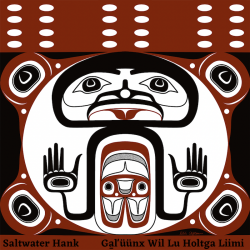Where the traditional voice of the ‘Ts’msyen language’ meets the traditional sound of Nashville Country.
 Saltwater Hank is the nom de plum of songwriter, fiddle player, and guitarist Jeremy Pahl, a member of the Gitk’a’ata Ts’msyen (Tsimshian) community, an indigenous people with a population of approximately 45,000 mostly based off the Pacific Northwest coast of British Columbia. By day he works in the archives of the Ts’msyen nation, teaching and studying the language, known as Sm’algyax, with its oral history and traditional songs, and by night he indulges in his love of country and roots music. On this new album, sung almost entirely in Sm’algyax, he sets out to marry the traditional language of his ancestors to the relatively more modern sound of Nashville with pedal steel, fiddle and electric guitars all to the fore.
Saltwater Hank is the nom de plum of songwriter, fiddle player, and guitarist Jeremy Pahl, a member of the Gitk’a’ata Ts’msyen (Tsimshian) community, an indigenous people with a population of approximately 45,000 mostly based off the Pacific Northwest coast of British Columbia. By day he works in the archives of the Ts’msyen nation, teaching and studying the language, known as Sm’algyax, with its oral history and traditional songs, and by night he indulges in his love of country and roots music. On this new album, sung almost entirely in Sm’algyax, he sets out to marry the traditional language of his ancestors to the relatively more modern sound of Nashville with pedal steel, fiddle and electric guitars all to the fore.
The album consists of nine tracks, two traditional, seven originals and one cover version. The two traditional tracks, ‘Uks Yarn K’ask’oos’ and ‘Goosni Waals Noon’ top and tail proceedings sung unaccompanied as a chant, with both songs relating to harvesting food along the beach. Food and living on and off the land are strong traditional topics within the Ts’msyen culture and Pahl has been careful to incorporate much of this within the seven original songs. Tracks such as ‘Dm You Stukwliin’ which includes the album’s only verse sung in English about BBQ rabbit with lots of pedal steel to sweeten the sound, whilst ‘Liimi Mak’ooxs’ is all about picking salmon-berries with some sprightly electric guitar and fiddle playing helping to spice up the flavour. Pahl has a distinct and strong vocal range, though his phrasing and delivery at times conjures up memories of Johnny Cash which helps to emphasise the country and Nashville influence across the album. That connection is further cemented by the one non-original track on the record with ‘Aka K’ul Wall Nsiip’nsgu’, a cover version of Hank Williams’ ‘My Sweet Lord Ain’t Around’. Elsewhere on the album the electric guitar is cranked up, as on tracks such as ‘Ba’wis’, a song about the legendary creature ‘Sasquatch’, whilst the heavy blues riffs on ‘Nit Wila Walt’ orbits the same stratosphere as Jimi Hendrix and possibly takes us closure to the traditional sound of the Ts’msyen culture which bends notes in a similar if slightly more organic way.
Pahl admits that his first goal with this album is to connect with other Ts’msyen people looking to better understand their own language and culture and that this collection of songs is very much a love letter to the tradition enveloped in a modern sound. This point is very important to fully understanding the thought process behind this record as it aims to emphasise that indigenous culture is and must always remain current to survive. To this end Pahl has recognised and taken on the responsibility of being a vessel to keep the chain of transmission unbroken. Therefore rather than just being a love letter to a tradition these songs represent a statement of resistance and resilience, pushing back against centuries of cultural eradication using language that dates back to before Ancient Greece.
‘Gal’üünx Wil Lu Holtga Liimi’ is an album, albeit barely twenty minutes in duration, that intrigues, and confuses in equal measures. An album that is understandably aimed at those connected to the Ts’msyen culture and its language and though the intentions behind the album are commendable the language barrier is likely to restrict its appeal to a larger audience. Recent years have seen global success for World Music Artists where English is not the spoken language. In particularly from Mali with such acts as Ali Farka Touré and more recently Tinariwen playing a mix of traditional and modern instruments that creates a sound that successfully evokes their homeland. Unfortunately here the musical arrangement, rather than working as a conduit with the language to create an atmosphere and ambience that helps to represent the Ts’msygen traditions and its environment, it instead too often sounds like a clash of cultures, disjointed and disappointingly at odds with itself.


